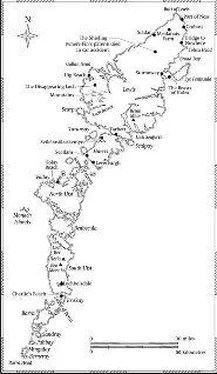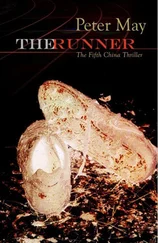Peter May - The Chessmen
Здесь есть возможность читать онлайн «Peter May - The Chessmen» весь текст электронной книги совершенно бесплатно (целиком полную версию без сокращений). В некоторых случаях можно слушать аудио, скачать через торрент в формате fb2 и присутствует краткое содержание. Жанр: Триллер, на английском языке. Описание произведения, (предисловие) а так же отзывы посетителей доступны на портале библиотеки ЛибКат.
- Название:The Chessmen
- Автор:
- Жанр:
- Год:неизвестен
- ISBN:нет данных
- Рейтинг книги:4 / 5. Голосов: 1
-
Избранное:Добавить в избранное
- Отзывы:
-
Ваша оценка:
- 80
- 1
- 2
- 3
- 4
- 5
The Chessmen: краткое содержание, описание и аннотация
Предлагаем к чтению аннотацию, описание, краткое содержание или предисловие (зависит от того, что написал сам автор книги «The Chessmen»). Если вы не нашли необходимую информацию о книге — напишите в комментариях, мы постараемся отыскать её.
The Chessmen — читать онлайн бесплатно полную книгу (весь текст) целиком
Ниже представлен текст книги, разбитый по страницам. Система сохранения места последней прочитанной страницы, позволяет с удобством читать онлайн бесплатно книгу «The Chessmen», без необходимости каждый раз заново искать на чём Вы остановились. Поставьте закладку, и сможете в любой момент перейти на страницу, на которой закончили чтение.
Интервал:
Закладка:
The world around me faded into some distant dimension as I crouched down to wipe my hand across the text, and only the words and the images they conjured had any presence in my consciousness.
Erected by the people of Lewis and friends in grateful memory of the men of the Royal Navy who lost their lives in the Iolaire disaster at the Beasts of Holm on the 1st January 1919. Of the 205 persons lost, 175 were natives of the island and for them and their comrades Lewis still mourns. With gratitude for their service and in sorrow for their loss.
I heard the sound of bikes starting up, and shouted goodbyes, as the group revved their engines and accelerated across the grass for the road home. I stood up, only to become immediately aware of a shadow at my shoulder. It was Whistler, a strange, bewildered look on his face. And beyond him, standing by his bike and staring out towards us, Big Kenny. Almost as if he were frightened to come and see for himself. All three of us had forgotten our fight by now, and the reasons for it. I searched Whistler’s eyes for some sign of understanding, and when I saw none, asked, ‘What’s the Iolaire ?’
He shrugged. ‘No idea.’
There was a strange quality in the light that night. And when the bus passed the shieling with the green roof out on the Barvas moor, I felt a shiver run through me. And sensed, perhaps more than ever before, the presence of my mother and father at this spot where they had lost their lives.
By the time I got home the sky was an odd purple colour, streaked with grey, and all yellow along the horizon where the sun laid down its liquid gold from behind cloud you couldn’t even see. Across the Minch, the mountains of Sutherland were as clear as I had ever seen them. Which meant there was bad weather on the way.
I couldn’t get the old man out of my mind, and I suppose I must have been unusually quiet, for it was unlike my aunt to ask me what was wrong. She was a peculiarly disinterested woman, my aunt, self-contained and rarely given to shows of emotion. She never treated me badly, but I always sensed her resentment at having been burdened with the care of her little sister’s boy. As if somehow I had stolen her life from her. A life, it appeared to me, that was already over, and passing in sad isolation in the big white house overlooking the jetty beyond the village.
She sat at the dinner table in one of her colourful chiffon wraps, candles burning already along the mantle, the smell of incense and cigarette smoke heavy in the air, like some melancholy memory of another life in a sixties world of youth and hope.
‘Come on,’ she said. ‘Spit it out, Finlay.’ She never spoke to me in Gaelic. And she never called me Fin. Just about the only person in the world not to.
‘What was the Iolaire ?’ I asked her.
She cast me a curious look. ‘Why do you ask about that?’
‘I saw the monument out at Holm Point today.’ I don’t know why, but I didn’t want to tell her about the old man.
Her eyes glazed over, gazing off into some distant past. She shook her head. ‘It’s something folk never really talked about. And today, I suppose, it’s all but forgotten.’
‘What happened?’
‘They say it was very nearly the worst maritime disaster in British peacetime history. Second only to the Titanic .’
‘And it happened here on Lewis?’ I was incredulous. Why had I never heard of it before?
‘On a black New Year’s morning on the rocks at the Beasts of Holm. Within sight of the lights of Stornoway harbour, and with hundreds of folk waiting at the pier.’ She was lost in silent thought for some minutes, and I didn’t dare speak in case she wouldn’t tell me any more. Finally she said, ‘It was 1919, the Great War had just ended, and God knows, enough of our menfolk had died already in that senseless conflict. But the rest were on their way home. Survivors all. Desperate to put their feet back on the island of their birth, and feel the arms of mothers and wives, sons and daughters around them.’
She liked a single glass of wine with her meal, my aunt. But that night she pulled the bottle towards her and poured a second.
‘They were Royal Navy Reservists,’ she said. ‘From Lewis and Harris. Dumped by the Ministry on to the pier at Kyle of Lochalsh off trains from Inverness. The rear admiral requisitioned an old tub of a steam-yacht called the Iolaire to bring back those of them that the MacBrayne’s mailboat couldn’t carry. More than two hundred and eighty as I recall.’ She shook her head. ‘Hopelessly inadequate it was. The men were in full uniform, and wearing heavy boots. Many of them didn’t have life jackets, and most couldn’t even find a seat.’ She took a sip from her glass. ‘A rough crossing it was, too. But they were within sight of home. They could see the lights of the harbour. It was claimed by some that the crew had been drinking whisky to celebrate the New Year. Whether or not that’s true we’ll never know, but the captain set the wrong course for the harbour and the Iolaire struck the reef at the Beasts.’
She stood up, taking her glass with her, and went to gaze from the window out over the bay below. She could see her own reflection in the glass, and adopted a pose that perhaps she thought conveyed the tragedy she described.
‘In fact, they were only a few yards from shore. That was the irony, after surviving all those years at war. The sea was wild, and many of them were simply dashed against the rocks. Others couldn’t swim. Didn’t know how.’ She glanced at Fin. ‘You know how it is with islanders.’ She returned her gaze to the window, raising her glass to her lips. ‘Some were middle-aged, others just teenagers. More than two hundred men died, nearly a hundred and eighty of them from the island. Some villages lost all their menfolk that night, Finlay. All of them.’
She turned back into the room. I couldn’t see her face properly against the last of the light from the window, just flickering features highlighted by her candles. It seemed hollow, like a skull, her hair a thin, wispy halo around her head.
‘I once heard the old men of the village talk about it. When I was a girl. The only time I can ever recall anyone speak of it. The bodies arriving back in Ness en masse. On horse-drawn carts that pulled four or six coffins apiece all the way up that long west coast road.’ She laid down her glass and lit a cigarette, and the smoke billowed around her head like breath on a frosty morning.
‘Did we lose someone? Our family, I mean?’
She shook her head slowly. ‘No. The Macleods of Crobost were one of the lucky ones. Your grandfather was a boy of nineteen, returning after just a year away. God knows how, but he survived.’ She looked at me, tipping her head at an oddly curious angle. ‘Your father’s father. You wouldn’t have been here today if he’d drowned like the rest.’ And I shivered, just as I had when the bus passed the shieling earlier in the evening.
‘Who was John Macleod?’ My own voice sounded very small. ‘Was he related?’
‘John Finlay Macleod, you mean?’ She drained her glass. ‘Not that I know of. That man was a hero by all accounts. Somehow he made it ashore with a line, right below where that monument is today, and as a result forty men’s lives were saved. Including your grandfather’s.’
I passed the weekend in a cloud of uncertainty and depression, unable to escape the thought of all those poor men surviving the war only to die on their own doorstep. And the fact that my grandfather had survived it lingered oddly in my mind like a faintly unpleasant taste in the mouth. It took me a while to identify it.
Guilt.
They say the survivors of major disasters are often afflicted by a sense of guilt. Why had they survived when so many others had not? I suppose I was experiencing it by association. If my grandfather had died like all the others, then I wouldn’t have been there. And it made me wonder why I was.
Читать дальшеИнтервал:
Закладка:
Похожие книги на «The Chessmen»
Представляем Вашему вниманию похожие книги на «The Chessmen» списком для выбора. Мы отобрали схожую по названию и смыслу литературу в надежде предоставить читателям больше вариантов отыскать новые, интересные, ещё непрочитанные произведения.
Обсуждение, отзывы о книге «The Chessmen» и просто собственные мнения читателей. Оставьте ваши комментарии, напишите, что Вы думаете о произведении, его смысле или главных героях. Укажите что конкретно понравилось, а что нет, и почему Вы так считаете.












